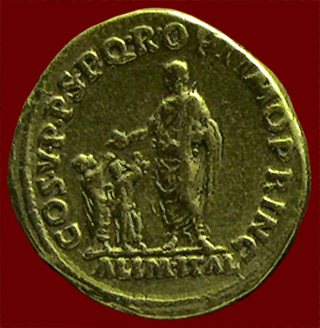 Aureus of Trajan: Donation to Girls and Boys |
While instances of public beneficence occur during the Republic (triumphs, feasts, funerals), it is only under the Empire that they become regular policy, certainly in so far as children and women are concerned. This subsistence has been presumed to be an offshoot of imperial concern for strengthening the family. Scholars differ as to whether the imperial program supported impoverished children or were given to all freeborn children as a form of imperial propaganda in the Italian municipalities. Of particular note are the coins minted under Nero and Trajan of the congiaria (donative) and alimenta (subsistence) type, showing the emperor making gifts to children, sometimes with an adult present. Soon after his succession, Trajan established municipal funds in the small towns of Italy to provide public support for freeborn girls and boys. The imperial disbursement schedule (see ILS 6675) provided a monthly stipend of twelve sesterces for girls and sixteen for boys --a generous allotment if one compares a soldier's daily pay at this time of under 4 sesterces. Pliny, who was exemplary in his generosity toward his native town of Comum (he endowed a public library, a public bath complex, an annual public dinner, and paid one-third of the teacher's salary for a local school), also provided a fund for the town's children. In this letter to Caninius, he instructs his fellow townsman on how to establish the endowment so as to protect its principal. |
| C[aius] PLINIUS CANINIO SUO S[alutem] |
| (2) Equidem nihil
commodius invenio, quam quod ipse feci. Nam pro
quingentis milibus nummum, quae in
alimenta
ingenuorum ingenuarumque
promiseram, agrum
ex
meis longe
pluris
actori publico
mancipavi;
eundem
vectigali
imposito recepi,
tricena milia annua
daturus. |
| (4) Nec
ignoro me plus
aliquanto quam donasse videor
erogavisse, cum pulcherrimi agri pretium
necessitas vectigalis
infregerit. |
| (5) Sed oportet privatis utilitatibus publicas, mortalibus aeternas anteferre, multoque diligentius muneri suo consulere quam facultatibus. |
| Vale. |
Click on the underlined words for translation aids and commentary, which will appear in a small window. Close the small window after each use.